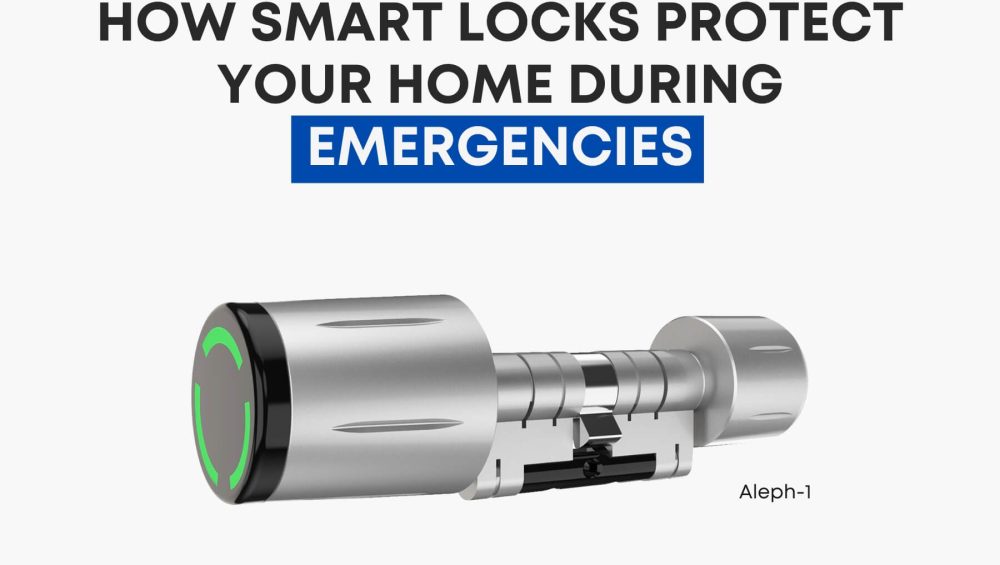Emergencies—fires, break-ins, or medical incidents—can happen in seconds. Traditional locks often delay emergency responders or compromise your property’s security when speed is critical. Smart locks, however, are transforming how Dubai homeowners, landlords, and holiday home operators manage crises by providing remote access, real-time alerts, and better control in urgent situations.
Why Smart Locks Are Essential During Crises
Dubai residents are turning to brands like Philips, Oji, Yale, and Schlage because these smart locks are designed to save precious time and improve safety when emergencies strike:
- Remote Access Control: Unlock your door from anywhere using a smartphone app so first responders or trusted contacts can get in quickly.
- Tamper & Intrusion Alerts: Receive instant notifications when someone attempts to force entry.
- Smart Home Integration: Connect with security systems, cameras, and alarms for automated safety responses.
Where Smart Locks Make the Biggest Impact (Real Scenarios)
-
Fires and Natural Disasters
- Scenario: A family in Dubai Marina had a fire alarm triggered while they were away. Their Philips DDL720-MVP-17HWS, paired with a smart home hub, allowed them to unlock the door remotely for firefighters, avoiding forced entry and property damage.
- Why It Matters: Remote unlocking during emergencies ensures quicker access for emergency services and can prevent damage from breaking doors open.
-
Medical Emergencies
- Scenario: An elderly homeowner in Jumeirah suffered a medical episode while alone. Their caretaker used the Oji Smart App linked to the Oji EVO to unlock the villa’s front door for paramedics within seconds, saving critical time.
- Why It Matters: Remote access for trusted contacts or emergency responders can be lifesaving in medical situations.
-
Break-Ins and Security Threats
- Scenario: In Downtown Dubai, a homeowner’s Yale Linus® Smart Lock sent a tamper alert after someone tried to force the door. The homeowner quickly notified the building’s security team, who responded before the intruder could gain entry.
- Why It Matters: Real-time tamper alerts allow you to act quickly, even when you’re not at home.
-
Holiday Homes and Short-Term Rentals
- Scenario: A property manager for a Palm Jumeirah holiday villa discovered guests had overstayed their booking and refused to vacate. Using the SIRA-approved Oji Aleph-1, she remotely disabled their access codes and regained control of the property without confrontation.
- Why It Matters: Remote code management ensures operators can act decisively during guest-related emergencies or violations.
Top-Rated Smart Locks for Emergency-Readiness
Philips Smart Locks
- Philips DDL720-MVP-17HWS: Advanced palm vein recognition, multi-access modes, and integration with smart home hubs for remote unlocking during emergencies.
- Philips DDL801-5HBS: Red Dot Design Award winner with ultra-fast fingerprint access and a robust build for villas and apartments.
- Philips DDL610-5HWS: Compact smart lock that allows custom emergency PINs for family members or neighbors.
Oji Smart Locks (SIRA-Approved for Holiday Homes)
- Oji Amber: Weatherproof and durable, perfect for Dubai’s villas and rental properties.
- Oji EVO: Heavy-duty mortise lock offering fingerprint, PIN, RFID, and app access; ideal for premium residences.
- Oji Aleph-1: Bluetooth + RFID-enabled cylinder smart lock with 30,000 battery cycles; reliable for high-turnover holiday homes.
Other Popular Models in Dubai
- Yale Linus® Smart Lock: Hands-free auto-unlock and compatible with Alexa and Google Home.
- Schlage Encode™ Plus: Built-in Wi-Fi, real-time alerts, and integrated alarms for added security.
- Igloohome Mortise 2+: Offline PIN codes for properties with intermittent internet connectivity.
How to Prepare Your Smart Lock for Emergencies
- Enable Remote Access: Connect the lock to the manufacturer’s app (Philips EasyKey or Oji Smart).
- Integrate with Security Systems: Pair with fire alarms and cameras for a complete response system.
- Set Emergency PINs: Provide backup codes to family or trusted neighbors.
- Maintain Battery Backup: Check battery status frequently and keep spares handy.
- Test Emergency Functions: Run quarterly drills to ensure remote unlocking, alerts, and integrations are functioning properly.
Why This Matters in Dubai
Dubai’s mix of high-rise apartments, luxury villas, and holiday rentals requires robust and reliable access control systems. SIRA-approved smart locks like the Oji Amber, Oji EVO, and Oji Aleph-1 are mandatory for holiday homes, while Philips and Yale models are excellent choices for homeowners seeking advanced emergency features.
Conclusion: Invest in Smart Locks That Can Save Lives
In emergencies, traditional locks can slow down help and increase risks. Smart locks such as the Philips DDL720-MVP-17HWS, Oji EVO, and Yale Linus® Smart Lock provide fast remote access, real-time alerts, and complete control over who can enter your property.
For Dubai homeowners, landlords, and holiday home operators, investing in the right smart lock means more than convenience—it’s about protecting lives and property during critical moments.



